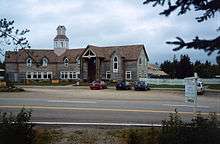The Gaelic College
| Colaisde Rìoghail na Gàidhlig | |
| Type | Educational institution |
|---|---|
| Established | 1938 |
| Affiliation | Non-denominational |
| Location |
St. Ann's, Nova Scotia, Canada 46°12′49″N 60°36′20″W / 46.21361°N 60.60556°WCoordinates: 46°12′49″N 60°36′20″W / 46.21361°N 60.60556°W |
| Campus | Cabot Trail |
| Colours | Red & black |
| Website | www.gaeliccollege.edu |
The Royal Cape Breton Gaelic College (Scottish Gaelic: Colaisde Rìoghail na Gàidhlig), also known as The Gaelic College (Scottish Gaelic: Colaisde na Gàidhlig), is a non-profit educational institution located in the community of St. Ann's, on Nova Scotia's Cape Breton Island, along the Cabot Trail. Founded in 1938, its focus has been on the perpetuation of Highland Scottish Gaelic culture. The college received permission in 2013 to use the prefix royal in its name, but does not employ it in day-to-day usage.
History
Colaisde na Gàidhlig, The Gaelic College, was founded in 1938 by Presbyterian minister the Reverend A.W.R. MacKenzie, opening in a one-room log building on land in St. Ann's.

In December 2013, to recognize the 75th anniversary of the college's founding, its name was changed to "The Royal Cape Breton Gaelic College" (Colaisde Rìoghail na Gàidhlig) after Elizabeth II, the reigning Canadian monarch, granted permission for use of the prefix "royal",[1] as requested to the federal Cabinet by the college's board of directors.[1][2] However some, including Allan MacMaster, Member of the Nova Scotia House of Assembly for Inverness, objected to the name change as offensive to Nova Scotians descended from Highlanders who had had to leave Scotland because of the Highland Clearances.[1][3] In response Kirk McRae, the Acting Chair of the Gaelic College, said it was "just an honour of name, it doesn't take away what the goals are of the college ... that is to grow the Gaelic culture."[3] The Chairman of the Monarchist League of Canada, Robert Finch, characterized the prefix as "a Canadian honour distinct from history's disputes between English and Scots."[2] In March 2014, the board of governors decided to discontinue day-to-day use of the "royal" prefix.[4]
Mission
The institution's mission is as follows:
"To promote, preserve and perpetuate through studies in all related areas: the culture, music, language, arts, crafts, customs and traditions of immigrants from the Highlands of Scotland."[5]
The early years of the college's history were dedicated to the instruction of the Scottish Gaelic language, which, in the 1930s, was under significant threat of dying out. It had once been spoken by over 100,000 Nova Scotians until the advent of modern transport and communications in the early 20th century began to force English assimilation in the agrarian economies of Cape Breton Island and Nova Scotia.
Today, the organization has a broader mandate to preserve the culture of the Scottish Highlanders, who settled in the area. Thousands of students from all over North America and around the world attend both summer sessions and courses held throughout the year. The college is also home base for organizations like the Cape Breton Fiddlers' Association and the annual Celtic Colours International Festival.
Program
The college's curriculum covers the following:
- Gaelic language
- Gaelic song
- Gaelic history
- Gaelic storytelling
- Gaelic drama
- Traditional bagpiping
- Cape Breton fiddling
- Cape Breton piano accompaniment
- Guitar accompaniment
- Cape Breton step dance
- Highland dance
- Bodhran
- Harp
- Whistle
- Weaving
See also
- Higher education in Nova Scotia
- Education in Canada
- List of Canadian organizations with royal prefix
References
- 1 2 3 The Royal Cape Breton Gaelic College (6 December 2013). "News > Honour Bestowed on Colaisde na Gàidhlig – the Gaelic College by Her Majesty the Queen". Archived from the original on 20 December 2013. Retrieved 19 December 2013. The college spelt the word Rioghail rather than Rìoghail.
- 1 2 Finch, Robert (5 February 2014), "'Royal' rejection a slap in Her Majesty's face", Cape Breton Post, retrieved 11 February 2014
- 1 2 "Royal designation reignites historical tensions at Cape Breton Gaelic College". CTV Atlantic. 17 December 2013.
- ↑ Beaton, Margie (7 March 2014). "Note from Board of Governors of Colaisde na Gàidhlig/The Gaelic College". Colaisde na Gàidhlig/The Gaelic College. Retrieved 25 March 2014.
- ↑ "About us: Our Mission". Colaisde na Gàidhlig / The Gaelic College. Retrieved 11 February 2014.